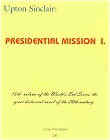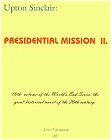
 THE JUNGLE by Upton Sinclair (hier online bestellen)
THE JUNGLE by Upton Sinclair (hier online bestellen)
The story:
The best-seller shockingly reveals intolerable labor practices and unsanitary working conditions
in the Chicago stockyards as it tells the brutally grim story of a Slavic family that emigrates
to America full of optimism but soon descends into numbing poverty, moral degradation, and despair.
A fiercely realistic American classic that will haunt readers long after they've finished the last
page.
About the author:
 Upton Beall Sinclair (September 20, 1878 – November 25, 1968) was a prolific American author who wrote over
90 books in many genres, often advocating socialist views, and achieved considerable popularity in the first
half of the twentieth century. He gained particular fame for his novel, The Jungle (1906), which dealt with
conditions in the U.S. meat packing industry and caused a public uproar that ultimately led to the passage
of the Meat Inspection Act in 1906.
Upton Beall Sinclair (September 20, 1878 – November 25, 1968) was a prolific American author who wrote over
90 books in many genres, often advocating socialist views, and achieved considerable popularity in the first
half of the twentieth century. He gained particular fame for his novel, The Jungle (1906), which dealt with
conditions in the U.S. meat packing industry and caused a public uproar that ultimately led to the passage
of the Meat Inspection Act in 1906.
However, the main point of The Jungle was lost on the public, overshadowed by his descriptions of unsanitary
conditions in the packing plants. The public health concerns dealt with in The Jungle are actually far less
significant than the human tragedy lived by his main character and other workers in the plants. His main goal
for the book was to demonstrate the inhuman conditions of the wage earner under capitalism, not to inspire
public health reforms in how the packing was done. Indeed, Sinclair lamented of his book and the public
uproar that resulted: "I aimed at their hearts, and hit their stomachs." Still, the fame and fortune he
gained from publishing The Jungle enabled him to write books on almost every issue of social injustice
in the 20th century.
Extract from book:
A full hour before the party reached the city they had begun to note the perplexing changes in the
atmosphere. It grew darker all the time, and upon the earth the grass seemed to grow less green. Every
minute, as the train sped on, the colors of things became dingier; the fields were grown parched and
yellow, the landscape hideous and bare. And along with the thickening smoke they began to notice another
circumstance, a strange, pungent odor. They were not sure that it was unpleasant, this odor; some might
have called it sickening, but their taste in odors was not developed, and they were only sure that it was
curious. Now, sitting in the trolley car, they realized that they were on their way to the home of it —
that they had traveled all the way from Lithuania to it. It was now no longer something far-off and faint,
that you caught in whiffs; you could literally taste it, as well as smell it — you could take hold of it,
almost, and examine it at your leisure. They were divided in their opinions about it. It was an elemental
odor, raw and crude; it was rich, almost rancid, sensual, and strong. There were some who drank it in as
if it were an intoxicant; there were others who put their handkerchiefs to their faces. The new emigrants
were still tasting it, lost in wonder, when suddenly the car came to a halt, and the door was flung open,
and a voice shouted — "Stockyards!"
Buchdaten:
THE JUNGLE
Sprache: Englisch
Taschenbuch - 320 Seiten - Dover Publications
Erscheinungsdatum: November 2001
ISBN: 0486419231
Preis: € 2,99
More works from the same author:
zurück zur Übersicht
|
 THE JUNGLE by Upton Sinclair (hier online bestellen)
THE JUNGLE by Upton Sinclair (hier online bestellen)
 Upton Beall Sinclair (September 20, 1878 – November 25, 1968) was a prolific American author who wrote over
90 books in many genres, often advocating socialist views, and achieved considerable popularity in the first
half of the twentieth century. He gained particular fame for his novel, The Jungle (1906), which dealt with
conditions in the U.S. meat packing industry and caused a public uproar that ultimately led to the passage
of the Meat Inspection Act in 1906.
Upton Beall Sinclair (September 20, 1878 – November 25, 1968) was a prolific American author who wrote over
90 books in many genres, often advocating socialist views, and achieved considerable popularity in the first
half of the twentieth century. He gained particular fame for his novel, The Jungle (1906), which dealt with
conditions in the U.S. meat packing industry and caused a public uproar that ultimately led to the passage
of the Meat Inspection Act in 1906.



